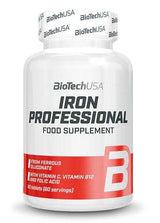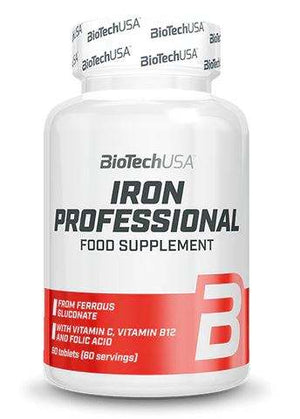Why do Iron Supplements cause Constipation?


Related products
Iron supplements are integral in managing and preventing iron deficiency anaemia, a condition marked by insufficient iron levels in the body, vital for the production of haemoglobin in red blood cells. Dr. Emily Clarkson, a leading haematologist, states, "Iron supplementation is crucial for individuals with iron deficiency anaemia, helping restore normal function and energy levels." Despite their benefits, a notable side effect of iron supplements is constipation, a condition characterised by infrequent or difficult bowel movements.
The prevalence of constipation as a side effect is significant. According to a study published in the British Journal of Medicine, approximately 20% of patients on iron supplements experience constipation, impacting their adherence to treatment. This symptom can lead to discomfort and, in severe cases, additional health complications.
This article aims to explore the mechanisms behind why iron supplements cause constipation, shedding light on this common yet often overlooked side effect. By understanding the underlying causes, healthcare professionals and patients can better manage this condition, ensuring effective and comfortable treatment for iron deficiency anaemia.
Role
Iron is a crucial mineral for various bodily functions, particularly for the formation of haemoglobin, a protein in red blood cells responsible for transporting oxygen throughout the body. Dr. James Peterson, a nutritionist, explains, "Iron is vital for energy production, immune function, and overall health. Without adequate iron, our bodies cannot produce enough healthy red blood cells, leading to anaemia." This condition can cause symptoms like fatigue, weakness, and shortness of breath.
Iron supplements are often prescribed to individuals who cannot meet their iron needs through diet alone. This includes people with certain health conditions, such as chronic kidney disease, or those who have undergone surgery. The World Health Organisation (WHO) reports that iron deficiency is the most common nutritional deficiency globally, affecting approximately 1.6 billion people.
Constipation is a well-known side effect of iron supplements. The exact mechanism behind this is complex and multifaceted. Iron supplements can alter the gut microbiome and influence intestinal motility. As Dr. Laura Thompson, a gastroenterologist, notes, "Iron supplements can disrupt the balance of gut bacteria and slow down the movement of the intestines, leading to constipation."
Additionally, iron supplements can harden stools, making them more difficult to pass. This is particularly true for certain forms of iron, such as ferrous sulfate. The presence of unabsorbed iron in the digestive tract can also contribute to constipation.
Furthermore, iron's interaction with other minerals and nutrients can exacerbate constipation. For instance, high doses of iron can reduce the absorption of other minerals like magnesium, which plays a role in maintaining regular bowel movements.
Managing Constipation
While constipation can be a challenging side effect, there are several strategies to manage it effectively. Dr. Clarkson recommends, "Patients on iron supplements should increase their fluid and fibre intake, engage in regular exercise, and consider stool softeners if necessary." These measures can help alleviate constipation and improve gut health.
In some cases, switching to a different form of iron supplement, such as ferrous gluconate or carbonyl iron, which are gentler on the stomach, can be beneficial. Time-release formulations of iron can also reduce the likelihood of constipation.
Constipation is a common side effect of iron supplements, with implications for patient comfort and adherence to treatment. Understanding the underlying mechanisms, such as alterations in the gut microbiome and reduced intestinal motility, can help in managing this condition. By incorporating lifestyle changes and considering alternative iron formulations, individuals can mitigate the impact of constipation and maintain effective treatment for iron deficiency anaemia. This approach aligns with the overarching goal of ensuring comprehensive and patient-friendly care in the management of iron deficiency and its related conditions.
Iron supplements are a cornerstone in treating and preventing iron deficiency, with various formulations available to cater to different needs and tolerances. Understanding the types of iron supplements, their specific indications, and the mechanism of action of iron in the body is essential for both healthcare providers and patients.
Types of Iron Supplements
There are several forms of iron supplements, each with unique properties and absorption rates. The most commonly prescribed types include:
-
Ferrous Sulfate: This is the most common and one of the most affordable forms of iron supplementation. It contains a high amount of elemental iron but is also associated with a higher incidence of gastrointestinal side effects, including constipation.
-
Ferrous Gluconate: This form contains less elemental iron compared to ferrous sulfate, making it gentler on the stomach. It is often recommended for those who experience severe gastrointestinal side effects from ferrous sulfate.
-
Ferrous Fumarate: This contains a higher concentration of elemental iron than ferrous gluconate but is usually well-tolerated.
-
Carbonyl Iron: This is a purer form of iron that is absorbed more slowly, reducing the risk of gastrointestinal side effects.
Dr. Sarah Hughes, a clinical pharmacist, advises, "The choice of iron supplement should be individualized based on the patient's tolerance, the severity of their anaemia, and their overall health profile."
Indications
Iron supplements are indicated in various conditions, including:
-
Iron-Deficiency Anemia: The primary indication for iron supplementation is iron-deficiency anemia, a condition where there is a decrease in the number of red blood cells due to a lack of iron. This can result from blood loss, poor diet, or increased iron needs during pregnancy.
-
Pregnancy: Iron requirements increase during pregnancy to support the growth of the fetus and placenta and to compensate for blood loss during childbirth.
-
Chronic Diseases: Conditions like chronic kidney disease or inflammatory bowel disease can lead to iron deficiency, necessitating supplementation.
-
Post-Surgical Recovery: Patients who have undergone major surgery, especially involving blood loss, may require iron supplements.
Mechanism
Iron plays a vital role in the body, primarily in the formation of haemoglobin, a protein in red blood cells that carries oxygen from the lungs to the rest of the body. Dr. Martin Lloyd, a haematologist, explains, "Iron is a key component of haemoglobin, and without adequate iron, the body can't produce enough healthy red blood cells, leading to anaemia."
In the digestive tract, iron is absorbed primarily in the duodenum and upper jejunum. Once absorbed, it binds to a protein called transferrin and is transported to various cells, including the bone marrow, where it is used to make haemoglobin. Any excess iron is stored in the liver, spleen, and bone marrow in the form of ferritin or hemosiderin.
Understanding the types, indications, and mechanisms of iron supplements is crucial in managing iron deficiency and its associated conditions effectively. This knowledge allows for tailored treatment plans that address individual patient needs while minimizing potential side effects like constipation.
Iron Absorption
The digestive system plays a critical role in the absorption of nutrients, including iron, from our diet. Understanding this process, particularly how iron is absorbed and the factors influencing its absorption, is essential for managing conditions like iron deficiency anemia and mitigating side effects of iron supplements, such as constipation.
The digestive system is a complex network that breaks down food into its basic components for absorption and use by the body. Dr. Helen Foster, a gastroenterologist, explains, "The digestive process begins in the mouth, where mechanical and chemical digestion starts. It then proceeds through the esophagus to the stomach, where acids and enzymes further break down food. The process continues in the small intestine, where most nutrient absorption occurs."
In the stomach, gastric acid plays a crucial role in iron absorption by converting iron into a soluble, absorbable form. The digested nutrients, including iron, then pass into the small intestine, where the bulk of absorption takes place.
How Iron is Absorbed in the Intestines

Iron absorption primarily occurs in the duodenum, the first part of the small intestine. The body regulates iron absorption based on its needs, ensuring that just the right amount is absorbed to prevent deficiency or toxicity.
Two forms of dietary iron are absorbed differently:
-
Heme Iron: Found in animal products, heme iron is absorbed more efficiently and is less affected by other dietary factors.
-
Non-Heme Iron: Found in plant-based foods and iron supplements, non-heme iron's absorption is influenced by various dietary components and the body's iron status.
The iron that is absorbed binds to a protein called transferrin, which transports it to where it is needed, including the bone marrow for red blood cell production.
Factors
Several factors can affect the absorption of iron:
-
pH Levels: The acidity of the stomach helps keep iron in a soluble state that is more readily absorbed. Dr. Foster notes, "Antacids and proton pump inhibitors can raise the stomach's pH and potentially reduce iron absorption."
-
Dietary Components: Certain foods and nutrients can either enhance or inhibit iron absorption.
- Enhancers: Vitamin C is known for significantly boosting non-heme iron absorption.
- Inhibitors: Phytates (found in grains and legumes), polyphenols (in tea and coffee), and calcium can inhibit iron absorption.
-
Iron Status of the Individual: The body adjusts iron absorption based on its iron stores. People with low iron levels absorb iron more efficiently.
-
Other Health Conditions: Certain gastrointestinal disorders, such as celiac disease or inflammatory bowel disease, can impair iron absorption due to damage or inflammation in the intestines.
Understanding the complex interplay between the digestive system and iron absorption is crucial in managing iron-related disorders effectively. By considering factors like dietary components and individual health status, healthcare providers can optimize iron supplementation and dietary recommendations to ensure adequate iron absorption while minimizing side effects.
Causes of Constipation
Constipation is a common and often uncomfortable side effect of iron supplementation. The causes of this condition are multifaceted, involving various aspects of iron's interaction with the gastrointestinal system.
Iron's Effect
Iron supplements can have a direct impact on the gastrointestinal tract. Dr. Emily Martin, a gastroenterologist, explains, "Iron can irritate the lining of the gastrointestinal tract, leading to symptoms like constipation, as well as nausea and abdominal discomfort." This irritation is more pronounced with certain forms of iron, such as ferrous sulfate.
The gastrointestinal irritation caused by iron supplements results from the body's response to what it perceives as a foreign substance. The high elemental iron content in supplements, especially in forms with higher bioavailability, can lead to inflammation and subsequent disruption of normal bowel function.
Role of Non-Absorbed Iron
Not all the iron consumed through supplements is absorbed by the body. The non-absorbed iron remains in the gastrointestinal tract, which can adversely affect bowel habits. Dr. Martin further notes, "Non-absorbed iron in the gut can alter water absorption and increase the growth of certain bacteria, contributing to constipation."
This unabsorbed iron can act as a pro-oxidant, potentially leading to oxidative stress in the gut. It can also affect the osmotic balance in the intestines, drawing water into the bowel and hardening the stools, making them more difficult to pass.
Impact
Iron supplements can influence gut motility — the movement of the digestive system that helps process food. Slowed gut motility means that food and waste products move more slowly through the intestines, leading to longer stool transit time and, consequently, constipation.
Additionally, iron supplements can affect stool consistency. "Iron supplements can make stools harder and drier, contributing to difficulty in bowel movements," Dr. Martin remarks. This change in stool consistency further exacerbates constipation.
Interactions
The gut microbiota, the complex community of microorganisms living in the intestines, plays a crucial role in overall gut health and function. Iron supplements can alter this delicate balance, potentially leading to digestive issues, including constipation.
Studies have shown that iron supplementation can change the composition and activity of the gut microbiota. Some types of bacteria, which may not be beneficial, can thrive in an iron-rich environment, leading to dysbiosis — an imbalance in the gut microbiota. This dysbiosis can affect the gut's motility and the consistency of stools, contributing to constipation.
The causes of constipation from iron supplements are diverse, involving direct effects on the gastrointestinal tract, the role of non-absorbed iron, impacts on gut motility and stool consistency, and interactions with the gut microbiota. Understanding these causes is essential for healthcare professionals and patients alike to manage and mitigate this common side effect, ensuring effective and comfortable treatment for iron deficiency.
Managing Constipation
Dealing with constipation induced by iron supplements involves a multi-faceted approach that includes lifestyle and dietary adjustments, medication interventions, and re-evaluating the iron supplementation strategy.
How to Stop Constipation
-
Increase Water Intake: Adequate hydration is essential. Dr. Alice Bennett, a nutritionist, advises, "Patients on iron supplements should increase their water intake to help soften stools and promote regular bowel movements."
-
Regular Exercise: Engaging in regular physical activity can stimulate bowel movements and alleviate constipation.
-
Monitor Iron Dosage: Overconsumption of iron can exacerbate constipation. It's essential to follow the prescribed dosage and consult a healthcare provider if constipation becomes a problem.
Dietary Recommendations

-
Increase Dietary Fiber: Consuming high-fiber foods like fruits, vegetables, whole grains, and legumes can help alleviate constipation. Fiber adds bulk to the stool and promotes bowel regularity.
-
Probiotic and Fermented Foods: These can help maintain a healthy gut microbiota, which can be beneficial in managing constipation.
-
Avoid Constipation-Inducing Foods: Limiting intake of low-fiber and high-fat foods, which can slow down the digestive process, is also recommended.
Use of Stool Softeners and Laxatives
-
Stool Softeners: These medications, such as docusate, can help soften stools, making them easier to pass. They are often the first line of treatment for constipation associated with iron supplements.
-
Laxatives: In more severe cases, a mild laxative might be necessary. However, they should be used sparingly and under medical supervision to avoid dependence.
Alternative Forms
-
Slow-Release Iron Formulas: These can reduce gastrointestinal irritation and lower the risk of constipation.
-
Ferrous Gluconate or Carbonyl Iron: These are gentler on the stomach and less likely to cause constipation compared to ferrous sulfate.
-
Liquid Iron Supplements: These might be more easily tolerated and can be adjusted to find the optimal dose that minimizes constipation.
Timing and Dosage
-
Splitting Doses: Taking smaller doses of iron throughout the day instead of a single large dose can reduce the risk of constipation.
-
Taking Iron with Food: Although this can reduce iron absorption slightly, it may help alleviate gastrointestinal side effects like constipation.
-
Evening Administration: Some patients find that taking iron in the evening rather than the morning can reduce constipation and other gastrointestinal side effects.
Managing constipation caused by iron supplements requires a comprehensive approach that includes dietary and lifestyle changes, the use of stool softeners or laxatives when necessary, considering alternative forms of iron, and being mindful of the timing and dosage of iron intake. Regular consultation with healthcare providers is crucial to tailor these strategies to individual needs and to ensure effective and comfortable treatment for iron deficiency.
Understanding Stool Changes
Changes in bowel habits and stool characteristics are common when taking iron supplements. Understanding why these changes occur and what they signify can help individuals better manage their iron therapy and differentiate between normal side effects and potential signs of complications.
Why It's Harder to Poop When Taking Iron
Iron supplements can make it more difficult to have a bowel movement due to several reasons:
-
Effect on the Gastrointestinal Tract: Iron can irritate the lining of the gastrointestinal tract, leading to inflammation and a reduction in the natural motility of the intestines. This decreased motility means that waste moves slower through the digestive system, contributing to constipation.
-
Alteration of Stool Consistency: Iron supplements can change the water balance in the intestines, often leading to harder, drier stools. Dr. Karen Smith, a gastroenterologist, explains, "Iron supplements can decrease water absorption in the gut, which dries out the stool and makes it more difficult to pass."
-
Impact on Gut Microbiota: The change in the gut's microbial balance due to iron supplementation can also affect bowel habits, including an increased likelihood of constipation.
Does Black Poop Mean Iron Tablets are Working?
The appearance of black stools while taking iron supplements is a common and typically harmless side effect. Dr. Smith clarifies, "Black stools from iron supplements are a result of the iron reacting with stomach acids and are not usually a cause for concern. It often indicates that the body is processing and eliminating excess iron."
However, it is important to differentiate between black stools caused by iron supplements and those that may indicate gastrointestinal bleeding. If the black stools are tarry with a foul smell, it could suggest bleeding in the upper gastrointestinal tract, and medical attention should be sought.
Experiencing harder stools and changes in stool color are common when taking iron supplements. These changes are usually due to the direct effects of iron on the gastrointestinal tract, stool consistency, and gut microbiota. While black stools can be a normal side effect of iron supplementation, it is crucial to be aware of the differences between harmless changes and signs of potential complications. Regular consultation with healthcare providers can help in effectively monitoring and managing these changes.
Risk Factors
While constipation is a common side effect of iron supplementation, not everyone experiences it to the same degree. Several factors influence an individual's susceptibility to constipation, including personal health history, existing gastrointestinal conditions, and lifestyle choices.
Individual Differences in Susceptibility to Constipation
-
Age: Older adults are more prone to constipation due to a natural decrease in gut motility and other age-related changes in digestive health.
-
Gender: Women, especially during pregnancy, are more likely to experience constipation. Hormonal changes and increased iron requirements during pregnancy can exacerbate this issue.
-
Genetic Factors: Some individuals may have a genetic predisposition that affects their gut motility and overall digestive health, making them more susceptible to constipation.
-
Previous History of Gastrointestinal Issues: Those with a history of constipation or other gastrointestinal problems are more likely to experience constipation when taking iron supplements.
Role
-
Irritable Bowel Syndrome (IBS): Individuals with IBS, particularly those with the constipation-predominant type, are more likely to experience exacerbated symptoms when taking iron supplements.
-
Inflammatory Bowel Diseases (IBD): Conditions like Crohn’s disease and ulcerative colitis can affect how the body processes and absorbs nutrients, including iron, thus influencing the likelihood of constipation.
-
Gastrointestinal Surgeries: People who have had surgeries that affect the digestive system, such as gastric bypass, may have altered iron absorption and bowel habits.
Dietary and Lifestyle Factors

-
Diet: A diet low in fiber and high in processed foods can contribute to constipation. Dr. Emily Thomas, a nutritionist, advises, "A balanced diet rich in fruits, vegetables, and whole grains can help maintain regular bowel movements."
-
Hydration: Inadequate fluid intake can lead to harder stools and constipation. It's especially important to increase water intake when consuming iron supplements.
-
Physical Activity: A sedentary lifestyle can slow down digestive processes, while regular exercise can promote healthy bowel function.
-
Medication Use: Certain medications, aside from iron supplements, can also contribute to constipation, such as opioids, some antidepressants, and antacids containing calcium or aluminum.
-
Stress and Psychological Factors: Chronic stress and mental health issues like anxiety and depression can impact gut motility and overall digestive health.
The risk of constipation from iron supplements varies among individuals due to a combination of age, gender, genetic factors, existing gastrointestinal conditions, and lifestyle choices. Understanding these factors can help in tailoring prevention and management strategies for constipation in individuals taking iron supplements, ensuring a more comfortable and effective treatment experience.
Clinical Perspectives
Exploring the clinical perspectives on the issue of constipation due to iron supplements involves delving into research studies, clinical trials, expert opinions, and real-world patient experiences. This multifaceted approach provides a comprehensive understanding of the issue and informs best practices for management and treatment.
Overview
Recent research studies and clinical trials have focused on understanding the prevalence, mechanisms, and management strategies of constipation caused by iron supplementation. For instance:
-
Prevalence Studies: Research has shown varying rates of constipation among patients taking iron supplements, with some studies indicating a prevalence of 20-30%. These studies highlight the need for effective management strategies.
-
Mechanism-Based Studies: Clinical trials have sought to understand the exact mechanisms by which iron supplements cause constipation. This includes exploring the impact on gut motility, microbiota, and intestinal water absorption.
-
Comparative Studies on Iron Formulations: Several studies have compared different iron formulations to determine which are less likely to cause gastrointestinal side effects, including constipation.
-
Interventional Trials: Clinical trials have tested the effectiveness of various interventions, such as dietary changes, use of probiotics, and stool softeners, in managing constipation in patients taking iron supplements.
Expert Opinions
Health organizations and experts in gastroenterology and nutrition have provided guidelines and opinions on managing constipation due to iron supplements:
-
Dietary Recommendations: Experts often recommend increasing dietary fiber and fluid intake and considering the timing and dosage of iron supplements to minimize constipation.
-
Guidelines on Iron Supplementation: Organizations like the World Health Organization (WHO) and the American Society of Hematology provide guidelines on iron supplementation, including recommendations for minimizing side effects like constipation.
-
Alternative Iron Formulations: Medical professionals often suggest trying different forms of iron, such as ferrous gluconate or slow-release formulations, to reduce gastrointestinal side effects.
Case Studies
Case studies and reports of patient experiences provide valuable insights into the real-world impact of constipation due to iron supplements and the effectiveness of various management strategies:
-
Individual Variability: Case studies often highlight the variability in patient responses to iron supplements, underscoring the need for personalized treatment approaches.
-
Success Stories: Reports of successful management of constipation with dietary adjustments, lifestyle changes, or alternative iron formulations can provide practical insights for both patients and healthcare providers.
-
Challenges in Treatment Adherence: Patient experiences also shed light on the challenges of adhering to iron therapy due to constipation, emphasizing the importance of addressing this side effect to ensure effective treatment of iron deficiency.
Clinical perspectives, encompassing research, expert opinions, and patient experiences, play a crucial role in understanding and managing constipation caused by iron supplements. This comprehensive approach enables healthcare providers to develop evidence-based, patient-centric strategies for mitigating this common and often bothersome side effect.
Conclusion
The issue of constipation caused by iron supplements is multifaceted, impacting a significant number of individuals who rely on these supplements for health reasons. This article has explored various aspects of this issue, from the mechanisms behind iron-induced constipation to management strategies and clinical perspectives.
-
Iron Supplements and Gastrointestinal Effects: Iron supplements, particularly in certain forms like ferrous sulfate, can cause gastrointestinal side effects, including constipation. This is due to factors like direct gastrointestinal irritation, alteration in gut motility, and changes in the gut microbiota.
-
Managing Constipation: Effective management strategies include dietary adjustments (increased fiber and hydration), physical activity, the use of stool softeners or laxatives, and considering alternative iron formulations.
-
Individual Variability: There is significant individual variability in susceptibility to constipation due to factors like age, gender, pre-existing gastrointestinal conditions, and lifestyle choices.
-
Clinical Perspectives: Research and clinical trials continue to explore the mechanisms and management of constipation related to iron supplements. Expert guidelines and patient experiences further inform best practices in this area.
Future Directions
-
Improved Iron Formulations: Ongoing research is needed to develop iron supplements with fewer gastrointestinal side effects, improving patient compliance and comfort.
-
Understanding Individual Variability: Further studies to understand why some individuals are more susceptible to constipation can lead to more personalized treatment approaches.
-
Holistic Management Approaches: Research into comprehensive management strategies that combine dietary, lifestyle, and pharmacological interventions is vital for a holistic approach to treating iron-induced constipation.
-
Impact of Gut Microbiota: Exploring the role of gut microbiota in more depth could lead to novel interventions, such as probiotics, to manage constipation.
For individuals taking iron supplements:
-
Stay Informed: Be aware of the potential side effects of iron supplements, including constipation, and understand that this is a common and manageable issue.
-
Dietary and Lifestyle Modifications: Incorporate dietary changes such as increasing fiber intake, stay hydrated, and engage in regular physical activity.
-
Seek Medical Advice: If constipation becomes a significant problem, consult with a healthcare provider. They can suggest alternative iron formulations, adjust dosages, or recommend other interventions like stool softeners.
-
Monitor Your Body’s Response: Pay attention to how your body responds to the iron supplement and any changes in bowel habits, and communicate these with your healthcare provider.
-
Adherence to Treatment: Despite the side effects, it's important to adhere to iron therapy as prescribed to effectively manage conditions like iron deficiency anemia. Work with your healthcare provider to find a balance that minimizes side effects while effectively treating your condition.
While constipation is a notable side effect of iron supplements, understanding its causes, effective management strategies, and individual variations in response can significantly mitigate this issue. Ongoing research and clinical insights will continue to enhance our understanding and management of this side effect, ultimately leading to improved patient outcomes and quality of life for those requiring iron supplementation.





















 Rated Excellent by 26,523+ Reviews
Rated Excellent by 26,523+ Reviews